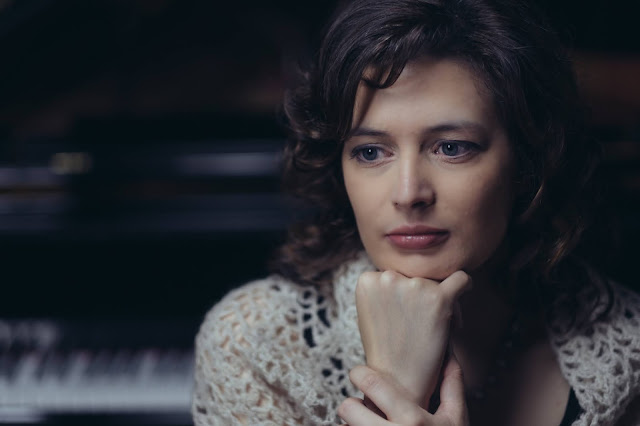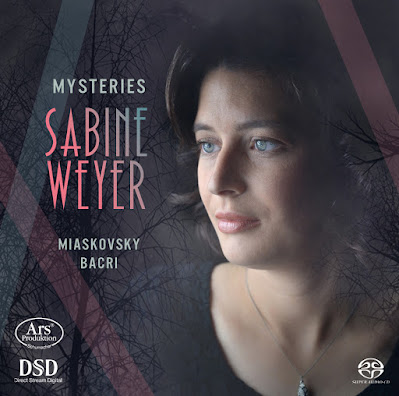Part of the attraction of Myaskovsky for Sabine is the way his music evolved over time, at first Romantic and then becoming more expressionistic, but later on because of the rigours of the Soviet regime his music become more Romantic again. She finds that he was always struggling to be true to himself, fighting against the Soviet regime. She sees Myaskovsky as always taking care of his inner voice in his music, and a great example of what an artist should be.
Myaskovsky's piano music is particularly important in the history of music, as he took the single-movement sonata inspired by Liszt and expanded it, evolving from the example of his older contemporary, Alexander Scriabin (1872-1915). So Sabine found Myaskovsky's music to be an extremely interesting discovery.
Though Myaskovsky is still being rediscovered in the West, he was famous in the USSR, won the Stalin Prize five times and was respected as a professor. His music is very much a development of Scriabin's late piano works, the tonal and harmonic language of the two is quite similar but Myaskovsky does not however use the colouristic writing (influenced by synesthesia) that Scriabin did.
Myaskovsky was friends with his younger contemporary Sergei Prokofiev (1891-1953), the two met at St Petersburg Conservatory, where Myaskovsky was a somewhat late starter. But unlike Prokofiev or Sergei Rachmaninov (1873-1943), Myaskovsky did not leave Russia but remained after the Revolution. As a result, his music tended to stay behind the Iron Curtain; though a French editor was interested in publishing Myaskovsky's music in the West, his family did not want his music published in a capitalist country. So, Sabine does not find it surprising that we do not know the music and that it is only now getting better known. Myaskovsky's music is now available in the West and his piano sonatas are published by Le chant du monde (an imprint now owned by Wise Music Classical).
Born in Paris, Nicolas Bacri studied at the Paris Conservatoire, where his music was initially conventially modernist but an encounter with composer Giacinto Scelsi (1905-1988), known for compositions based on a single pitch, with microtonal alterations, changes of dynamics, timbre, whilst Bacri was studying at the French Academy in Rome had a profound effect, and Bacri realised that complexity and extreme material were not necessary, he began to explore tradition. For a long period his music remained outside the scope of the new music establishment in France, but things have relaxed somewhat recently. He remains one of the most performed contemporary French composers. As Director of Chamber Music for Radio France (1897-1991), he organised the first performance of the complete string quartets cycle by Shostakovich.
Having first discovered Nicolas Bacri's work and started a professional relationship with him, working on his sonatas, Sabine has developed a personal friendship with him. She sees Bacri's music as contemporary, yet lyrical, musical and often very touching. Bacri is influences by Romantic music in way which expands on tonality, he combines Classical and Romantic forms with a modern language. Sabine also finds that his piano music, whilst difficult, is well written for the piano.
A number of Sabine's previous discs have paired composers that do not always immediately seem to be companions, but these pairings seem to her to shed light on the music. Her combination of music by Debussy and by Rameau (on her disc Images) played on the contrast between the two composers, but they are both French and Sabine sees other links between them. The pairing of music by Bach and Mendelssohn (on her disc with violinist Olga Pak and Berliner Camerata on ARS Produktion) was more obvious given Mendelssohn's role in the 19th century revival of Bach's music.
She sees similar ideas linking the music of Myaskovsky and Bacri, both treat the sonata form in some way that is lyrical, and she sees both struggling against a regime. Myaskovsky with his need to modulate his style to suit the repressive Soviet regime, and Bacri writing lyrical music against the prevailing modernist orthodoxy. So for Sabine there are more links than contrasts between the two.
As a pianist, Sabine divides her time between chamber music, solo work and concertos. She enjoys chamber music, and regards herself as luck to have opportunities to play with orchestras as such concerts are harder to get than solo recitals. Her recording catalogue already includes two discs with orchestra, the aforementiong Bach and Mendelssohn disc, and a recording of Shostakovich's Piano Concerto No. 2 with the Nordwestdeutsche Philharmonie and Erich Polz (also on ARS Produktion).
Initially, Sabine's core interests were French music and the Romantic German repertoire, Schumann and Brahms (though she played a lot of concerts of these latter, she has never recorded any). But then she had something of a breakthrough, and wanted to define herself as a pianist, so she considered what was the music that she most liked, most wanted to play and record. She loves the Russian music of the early 20th century, and it is not well known, hence her decision to concentrate on this repertoire. She would like to be the kind of pianist that investigates this music, and she confesses that she has an entire list of piano concertos by 20th century Russian composers that she would like to perform.
In fact, following on from Myaskovsky, her next project will be to record Mieczysław Weinberg's piano sonatas. Mieczysław Weinberg (1919-1996) was born in Poland, but fled the Nazis and ended up in Russia where he became of friend of Dmitri Shostakovich.
Looking ahead, she has been asked to play a recital at the Philharmonie in Luxembourg in May 2021, and was asked what she wanted to play so she will be performing music that she thinks defines her, French and Russian, Debussy, Rameau, Nicolas Bacri, Weinberg, Myaskovsky and Scriabin.
 |
| Sabine Weyer |
She always wanted to be a pianist, and knew this from an early age. For a time she also played the organ, but does not have time any more. Her prime influences start with two of her teachers. First, the Bulgarian Vassil Guenov, who taught her from the age of 15 to 18. From him she learned important technical aspects of the piano, the way to approach the keyboard, at a time when she needed someone to advise on technique. She then studied at Brussels Conservatoire where second influence was her teacher there, the Serbian Aleksandar Madžar. He was brilliant musically, and opened new horizons for her and made her evolve as a musician.
Whilst studying in Brussels she went to a lot of concerts and was very influenced by the piano playing of Grigory Sokolov, going at least once a year to his recitals and after each one she fled she understood more about music. She also found that when playing chamber music, the other musicians taught her about herself and about music. She finds it inspiring to play with different musicians and different personalities.
During 2020, with no concerts and an empty diary Sabine decided to take a different path. She has been using the time to learn Weinberg's piano sonatas, and hopes to record half in Spring 2021 in Paris, and the remainder at the end of 2021. She has also been writing a book about Nicolas Bacri's music; this takes the form of a complete catalogue (there are nearly 160 works) combined with her writings about the music and her interviews with the composer. The book is planned for September 2021, and hopes that an English translation (the book is in French) will be issued quickly.Sabine Weyer on disc:
- Mysteries - Nicolas Bacri, Nikolai Myaskovsky - Sabine Weyer - ARS Produktion, available from Amazon, jpc.
- Bach to the Future - Bach transcriptions by Busoni, Siloti, Saint-Saens - Sabine Weyer - ARS Produktion, available from Amazon
- Images - Debussy, Rameau - Sabine Weyer - Orlando Records, available from Amazon, Hive.
- A Light in the Dark - Shostakovich - Sabine Weyer, Nordwestdeutsch Philharmonie, Erich Polz - ARS Produktion, available from Amazon,
- Bach, Mendelsohn - Sabine Weyer, Olga Pak, Berliner Camerata - ARS Produktion, available from Amazon, Hive.
The blog is free, but I'd be delighted if you were to show your appreciation by buying me a coffee.
- The missing link: romances by Alexander Dargomyzhshky, a friend of Glinka and an influence on a later generation of Russian composers - CD review
- If Haydn went to Scotland: the Maxwell Quartet continues its exploration of Haydn's London quartets alongside 18th century Scots traditional tunes - CD review
- A surprisingly complex work: Puccini's late Verismo classic, Il Tabarro, in a new studio recording from Dresden - CD review
- Dowland transmuted: Time Stands Still from Portuguese composer Nuno Côrte-Real - CD review
- The pocket watch and the news periodical: how the public concert developed in 17th and 18th century London - feature article
- Researching the mathematics of emotions: composer Arash Safaian on his recent fantasy about Beethoven's music, This is (Not) Beethoven - interview
- Berlioz and the creation of Gluck's Orphée et Eurydice as a 19th century masterpiece - CD review
- Awaiting re-discovery: Grétry's Richard Coeur-de-lion returning to Versailles for the first time since 1789 proves to be a work of charm and imagination - CD review
- Irlandiani: Carina Drury's new disc explores the links between Italian composers in 18th century Dublin and Irish traditional music - CD review
- Inviolata: lutenist Jacob Heringman returns to the fascinating genre of Josquin's sacred music intabulated for lute and for vihuela - CD review
- A thirty-year gap and clarinettist Ernst Ottensamer's last concerto recording: conductor Richard Stamp talks about the challenge and rewards of bringing his latest disc to fruition - interview
- Home











%20as%20Leporello%20and%20Erik%20Tofte%20(back%20to%20camera%20in%20garnet%20shirt)%20as%20Giovanni%20-%20Don%20Giovanni.jpg)

No comments:
Post a Comment